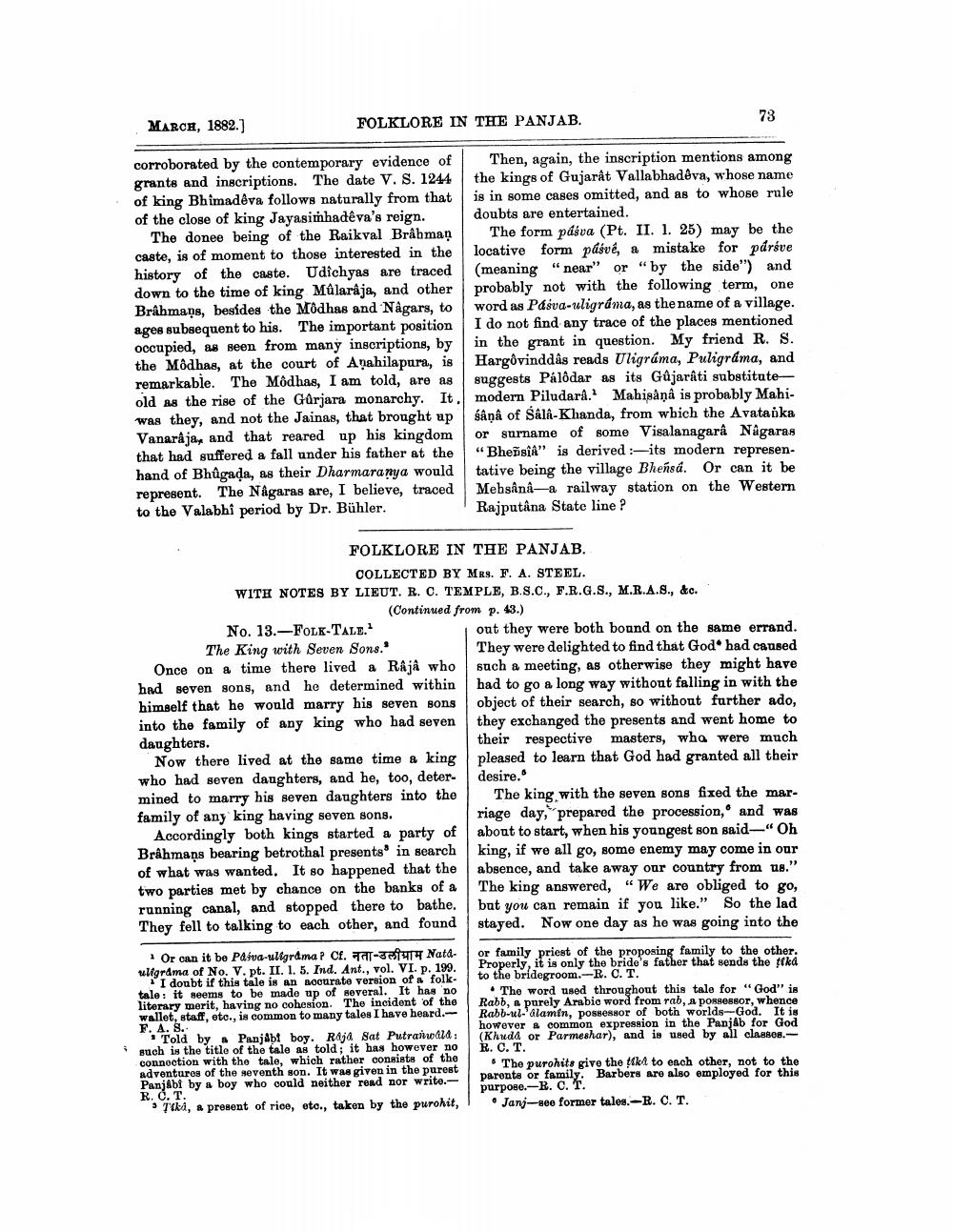________________
MARCH, 1882.)
FOLKLORE IN THE PANJAB.
73
corroborated by the contemporary evidence of Then, again, the inscription mentions among grants and inscriptions. The date V. S. 1244 the kings of Gujarât Vallabhadêva, whose name of king Bhimadêva follows naturally from that is in some cases omitted, and as to whose rule of the close of king Jayasimhadêva's reign. doubts are entertained.
The donee being of the Raikval Brâhman The form pásva (Pt. II. 1. 25) may be the caste, is of moment to those interested in the locative form pásvé, a mistake for páráve history of the caste. Udichyas are traced (meaning "near" or "by the side") and down to the time of king Mâlarâja, and other | probably not with the following term, one Brahmans, besides the Mòdhas and Någars, to word as Pasva-uligráma, as the name of a village. ages subsequent to his. The important position I do not find any trace of the places mentioned occupied, as seen from many inscriptions, by in the grant in question. My friend R. S. the Môdhas, at the court of Anahilapara, is Hargôvinddas reads Uligráma, Puligrama, and remarkable. The Módhas, I am told, are as suggests Pálôdar as its Gůjarâti substituteold as the rise of the Görjara monarchy. It. modern Piludara. Mahisana is probably Mahiwas they, and not the Jainas, that brought up saņå of Sál-Khanda, from which the Avatarka Vanarâjaand that reared up his kingdom or surname of some Visalanagara Nagaras that had suffered a fall under his father at the "BhesiA" is derived its modern represen. hand of Bhúgada, as their Dharmara nya would tative being the village Bhensá. Or can it be represent. The Nagaras are, I believe, traced Mebsana--a railway station on the Western to the Valabhî period by Dr. Bühler.
Rajputâna State line?
FOLKLORE IN THE PANJAB.
COLLECTED BY MRS. F. A. STEEL. WITH NOTES BY LIEUT. R. C. TEMPLE, B.S.C., F.R.G.S., M.R.A.S., &c.
(Continued from p. 43.) No. 13.-FOLK-TALE.
out they were both bound on the same errand. The King with Seven Sons."
They were delighted to find that God had caused Once on a time there lived a Rajâ who such a meeting, as otherwise they might have had seven sons, and he determined within had to go a long way without falling in with the himself that he would marry his seven sons object of their search, so without further ado, into the family of any king who had seven they exchanged the presents and went home to daughters.
their respective masters, who were much Now there lived at the same time a king pleased to learn that God had granted all their who had seven daughters, and he, too, deter- | desire. mined to marry his seven daughters into the The king with the seven sons fixed the marfamily of any king having seven sons.
riage day, prepared the procession, and was Accordingly both kings started a party of about to start, when his youngest son said—“Oh Brahmans bearing betrothal presents in search king, if we all go, some enemy may come in our of what was wanted. It so happened that the absence, and take away our country from us." two parties met by chance on the banks of a The king answered, “We are obliged to go, running canal, and stopped there to bathe. but you can remain if you like." So the lad They fell to talking to each other, and found stayed. Now one day as he was going into the
* Or can it be Pdfva-uligrama ? Cf. TAT-T141 Nataligrama of No. V.pt. II. 1. 5. Ind. Ant., vol. VI. p. 199.
I doubt if this tale is an acurate version of a folk tale: it seems to be made up of several. It has no literary merit, having no cohesion. The incident of the wallet, staff, ato., is common to many tales I have heard. F. A. S.
Told by Panjabt boy. Raja Sat Putramara: such is the titlo of the tale as told; it has however no connection with the tale, which rather consists of the adventures of the seventh son. It was given in the purest Panjabi by a boy who could neither read nor writo.R.C.T.
Tiki, a present of rice, etc., taken by the purohit,
or family priest of the proposing family to the other. Properly, it is only the bride's father that sends the fika to the bridegroom.-R.C.T.
The word used throughout this tale for "God" is Rabb, a purely Arabic word from rab, A PORRessor, whence Rabb-ul- Glamin, possessor of both worlds-God. It is however & common expression in the Panjab for God (Khudd or Parmeshar), and is used by all classes. R.C.T.
The purohito give the ki to each other, not to the parents or family. Barbers are also employed for this purpose.-R. C. T.
Janj-see former tales.-R. C. T.




